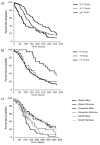Disparities in completion rates of the medical prerenal transplant evaluation by race or ethnicity and gender
- PMID: 25531896
- PMCID: PMC4274742
- DOI: 10.1097/TP.0000000000000271
Disparities in completion rates of the medical prerenal transplant evaluation by race or ethnicity and gender
Abstract
Background: A significant number of potential kidney transplant candidates do not complete the required medical evaluation after referral to a transplant program.
Methods: Factors associated with rate of completion of the renal transplant evaluation were analyzed using a retrospective chart review of patients first seen between October 1, 2009, and September 30, 2010 (n=256). The primary endpoint was completion in 12 months. Independent variables included socioeconomic, demographic, and medical factors.
Results: Mean age was 50.7 years; 49.6% were black, 28.5% Hispanic, and 21.9% white and other; 26.3% did not require dialysis. During follow-up, 23.4% did not complete the evaluation. Multivariable analysis indicated that slower rates of completion were associated with needing a greater number of medical tests (compared to 0-2: 3-5 tests, hazard ratio [HR]=0.65, P=0.02; ≥ 6 tests, HR=0.47, P=0.0005) and requiring more than one hospitalization (compared to none: HR=0.37, P=0.0008). A significant interaction between race or ethnicity and gender on completion was found: compared to black men, Hispanic men (HR=2.75, P<0.0001), Hispanic women (HR=1.96, P=0.006), and white men (HR=1.99, P=0.005) showed a more rapid completion. In comparison, black and white women (HR=1.38, P=0.16; HR=0.94, P=0.83, respectively) were not significantly different from black men in rates of completion. Differences by race or ethnicity and gender were not confounded by socioeconomic variables or social support.
Conclusion: To lessen barriers and facilitate renal transplantation, black men and women, white women, and patients needing multiple medical tests and requiring several hospitalizations may benefit from additional assistance during the medical evaluation process.
Conflict of interest statement
The authors declare no conflicts of interest.
Figures


References
-
- Evans RW, Manninen DL, Garrison LP, et al. The quality of life of patients with end-stage renal disease. N Engl J Med. 1985;312:553. - PubMed
-
- Wolfe RA, Ashby VB, Milford EL, et al. Comparison of mortality in all patients on dialysis, patients on dialysis awaiting transplantation, and recipients of a first cadaveric transplant. N Engl J Med. 1999;341:1725. - PubMed
-
- Eggers PW. Effect of transplantation on the Medicare end-stage renal disease program. N Engl J Med. 1988;318:223. - PubMed
-
- United States Renal Data System. United States Renal Data System 2012 Atlas. Visited November 2012. www.usrds.org/2012/view/v2_07.aspx.
Publication types
MeSH terms
Grants and funding
LinkOut - more resources
Full Text Sources
Medical

